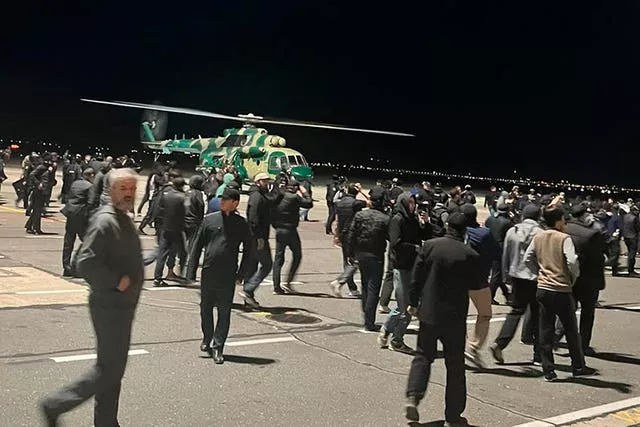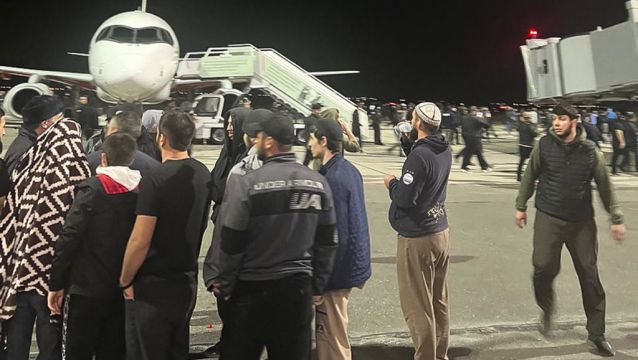Russian President Vladimir Putin has called a meeting of top security and police officials – the day after a mob stormed an airport in the region of Dagestan after a plane from the Israeli city of Tel Aviv landed there.
Hundreds of angry men rushed on to the asphalt of the airport in Makhachkala, the capital of the predominantly Muslim region, late on Sunday, looking for Israeli passengers, according to Russian news reports.
Dagestan’s Ministry of Health said more than 20 people were hurt, with two in a critical condition.
It said the injured included police officers and civilians.

The local Interior Ministry said 60 people were detained in the unrest.
It was not clear if charges have been filed against any of them but Russia’s Investigative Committee said it opened a criminal probe on charges of organising mass unrest.
The crowd broke out on to the landing field and surrounded the plane belonging to the Russian carrier Red Wings, with seemingly little resistance from the police, Russian news outlets reported.
Video and photographs on social media showed some in the crowd waving Palestinian flags and some trying to overturn a police car.
Others held handwritten banners saying “Child killers are not welcome in Dagestan” and “We’re against Jewish refugees”.
Some in the crowd examined the passports of arriving passengers, apparently in a bid to identify those who are Israeli.
The riot was later broken up.
The Makhachkala airport will remain closed until 3am on Tuesday, Russia’s civil aviation authority Rosaviatsia said.
The Kremlin on Monday blamed the unrest on “outside interference” and Mr Putin’s spokesman Dmitry Peskov said the meeting will discuss “attempts by the West to use the events in the Middle East to divide the (Russian) society”.
“It is well known and obvious that yesterday’s event around the Makhachkala airport is largely the result of outside interference, including information influence from outside,” Mr Peskov told reporters at his daily news conference.
Also on Monday, Russia’s state news agency RIA Novosti cited Dagestan governor Sergei Melikov as saying the unrest was co-ordinated in a Telegram channel run by “traitors” based in Ukraine, with the goal of destabilising the situation in Dagestan and fuelling unrest.
According to Russia’s independent news cite Mediazona, local Telegram channels had said before the unrest that “refugees from Israel” were about to arrive in Dagestan.
One such channel, Mediazona said, was founded by former Russian politician Ilya Ponomaryov, who currently lives in Ukraine and claims to be involved with a guerilla movement inside Russia.
The Associated Press could not independently confirm the report.
Mr Ponomaryov said he no longer has ties with the channel.
Russia has issued carefully calibrated criticism of both sides in the war between Israel and Hamas, a conflict that is giving Moscow bold new opportunities — to advance its role as a global power broker and challenge western efforts to isolate it over Ukraine.
Following the Dagestan unrest, Israeli Prime Minister Benjamin Netanyahu’s office said Israel “expects the Russian law enforcement authorities to protect the safety of all Israeli citizens and Jews wherever they may be and to act resolutely against the rioters and against the wild incitement directed against Jews and Israelis”.
Mr Netanyahu’s office added that the Israeli ambassador to Russia was working with Russia to keep Israelis and Jews safe.
While voicing support for Palestinians in Gaza, the regional Dagestani government appealed to citizens to remain calm and not take part in such protests.
The Supreme Mufti of Dagestan, Sheikh Akhmad Afandi, also appealed for peace.
“We understand and perceive your indignation very painfully… We will solve this issue differently. Not with rallies, but appropriately. Maximum patience and calm for you,” he said in a video published to Telegram.
Dagestan govenor Mr Melikov promised consequences for anyone who took part in the violence, and wrote on Telegram that what happened at the airport was “outrageous and should receive an appropriate assessment from law enforcement agencies”.







